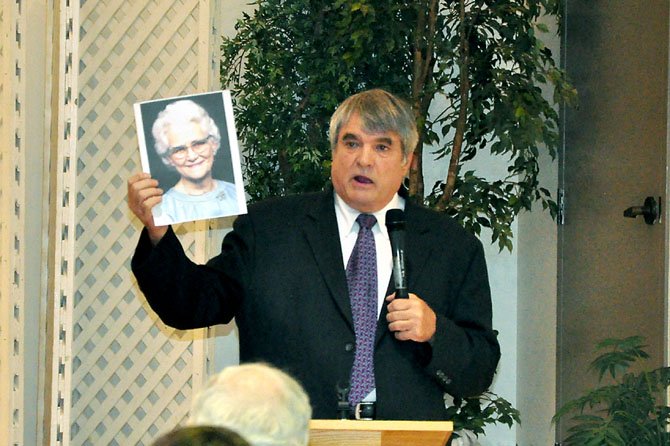Ohio governor commutes death sentence for third time in 13 months
By Kim Palmer
CLEVELAND | Tue Jul 10, 2012 5:52pm EDT
(Reuters) – Ohio Governor John Kasich on Tuesday commuted the death sentence of a man scheduled to be executed July 26, marking the third time in 13 months the first-term Republican has halted a death sentence.
Fighting Capital Punishment: Anti-death penalty advocates speak at St. John Neumann

Bill Pelke, co-founder and president of Journey to Hope, an anti-capital punishment organization, holds a picture of his grandmother, who was murdered in 1985. Pelke and other speakers that have been affected by the death penalty spoke at St. John Neumann Catholic Church Monday, June 25. Photo by Alex McVeigh.
By Alex McVeigh
Reston — For most people, the death penalty is a concept that occasionally intersects their lives in the form of news reports about people from across the country. But for others, it is something that has taken someone away from them, or threatens to. St. John Neumann Catholic Church hosted a panel discussion of members of Journey to Hope, a group consisting of families of murder victims, as well as others who have been touched by the death penalty in America.
Charity Lee’s life has been marked by death, starting from a young age. In 1980, when she was 6, her father was shot to death in their Georgia home. Later her mother was arrested and charged for hiring someone to kill her father and faced the death penalty but was later acquitted.
“The state of Georgia was supposedly looking for justice for the victim, well, I was the victim. I lost my father,” Lee said. “And they wanted to take my mother from me too. If she’s guilty, fine, lock her up, but if you kill her, I’m an orphan.”
Lee said she spent the next two decades sorting out her feelings toward her mother, unsure of her guilt or innocence and is now convinced that her mother was guilty. Meanwhile, she had two children, a son Paris and daughter Ella. But tragedy was to strike her again, in an even more personal manner.
Northup: Death Penalty: Virginia should end this unfair practice
By: STEPHEN A. NORTHUP | Times-Dispatch
Published: June 28, 2012
Forty years ago this week, the U.S. Supreme Court in Furman v. Georgia struck down the death penalty across the country, saying that the inconsistent manner in which it was applied constituted cruel and unusual punishment in violation of the Constitution. When the death penalty was reinstated four years later in Gregg v. Georgia, new capital sentencing procedures were expected to make the nation’s most severe punishment less arbitrary and more fair. The court described the new statutes as “a responsible effort to define those crimes and those criminals for which capital punishment is most probably an effective deterrent.”
Decades later, random factors such as the race of the victim, the jurisdiction in which the crime was committed and the quality of defense counsel continue to exert significant influence on whether a defendant will receive the death penalty. Last year, a study of the Louisiana death penalty found that the odds of a death sentence were 97 percent higher for cases in which the victim was white than for those in which the victim was black. A similar study in 2000 concluded that “race continues to be a significant factor in capital sentencing” in Virginia. Just this week, the 4th Circuit U.S. Court of Appeals affirmed the decision of a federal district court in Roanoke vacating the death sentence of Leon Winston on the ground…
